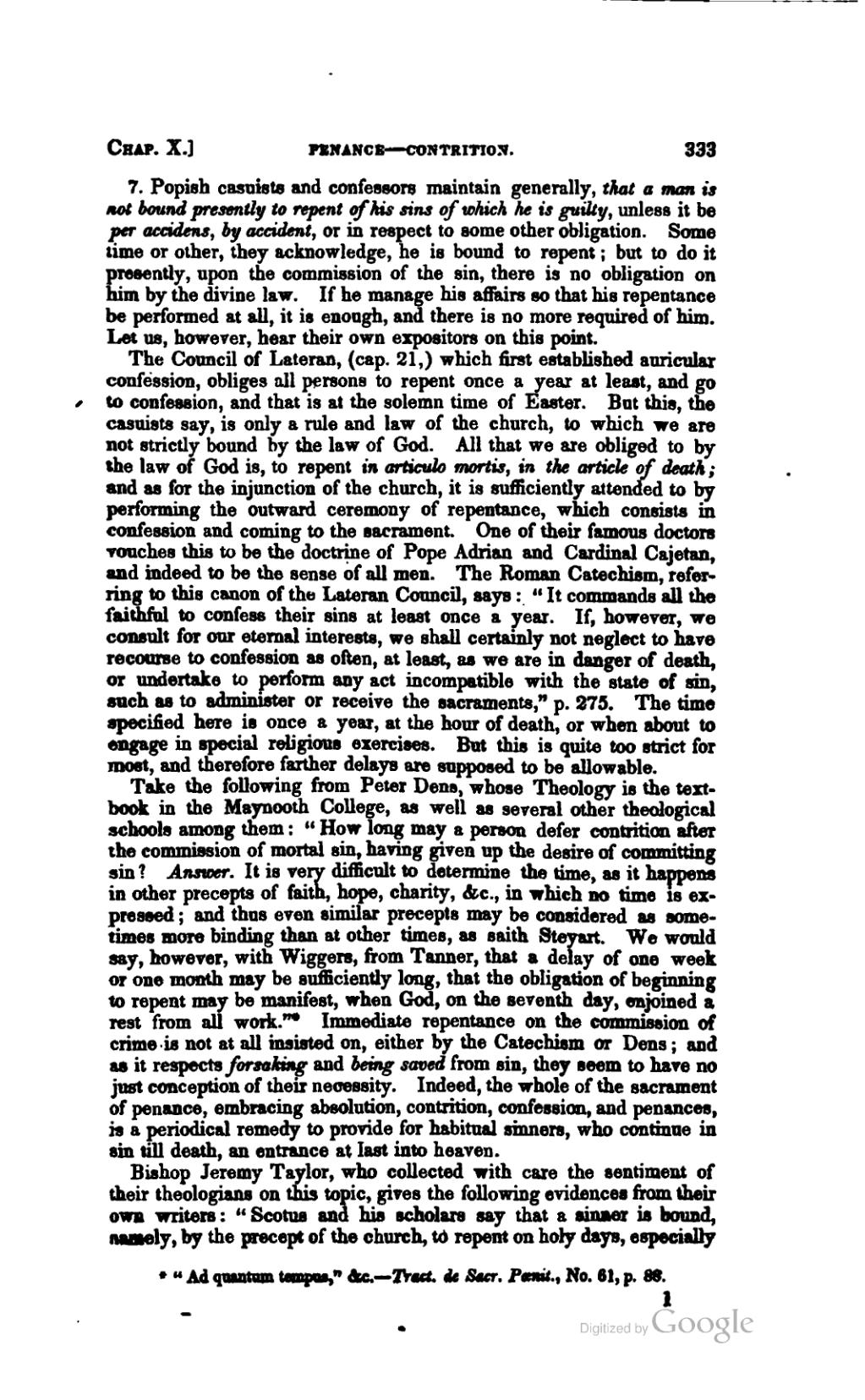CHAP. X.] PBffANC B-'--COR TRITIO.?. 333 7. Popish casuists and confessors maintain generally, tAat a man is ? bo?nd.p?sffie2y to ?nr ofAi? ? of ?A b ? ?y, ?leas it be ? ?, by ?r, or ? r?pect to ?me o?er ?!i?on. Sine time oF other, they ?owledge, he is ?d to ?nt; b? m do it p?ndy, u?n ?e ?mmhsion of ?e sin, the? is no obli?on on ?m ? ?e ?vine law. If he ?age ?s ? ? ?t ?s re?n?nce ? ?o?ed at ?, it i8 ensue, ?d there i8 no more M?d of ?. ? ?, h?ever, hear ?e? own e?ito? on ?is ?ht. The ?cfi of Late?, (cap. 21,) w?ch ?t e?bHsh? a? ?ssi?, obli?s ?1 ?ons to feint once aye= at le?t, ?d? m conf?ion, ?d that is at ?e solemn ?me of E?r. But ?8, casuists say, is only a rule and law of the church, to which we are not strictly bound by the law of God. All that we are obliged to by the law of Ood is, to repent in ? ?'ti?, in tAe arti? of hA; and as for the injunction of the church, it is sn?ciently attended to by performiug the outward ceremony of repentance, which consists in cenfession and coming to the sacrament. One of their famous dectom vouches thi? to bo the doctr?n. e of Pope Adrian and Cardinal Cajetan, and indeed to be the sense of all men. The Roman Catechism, refer- ring to this canon of the Lateran Council, asy9 :. "It command? all the f?ithful to confess their sins at least once a year. If, however, we consult for our eternal interera, we shall certainly not neglect to have reconrse to confession as often, at least, as we are in danger of death, or undertake to ?erform any act incompatible with the state of sin, such a? to administer or receive the sacraments,"p. 275. The time al?citled here is once a year, at the horn' of death, or when about to e?gage in ?pecial religions exertbee. But this is quite too ?trict for meet, and therefore farther del?y9 are wuppe?l to be allowable. Take the following from Peter Dens, whose Theology' is the text- book in the Maynooth College, as well as several other ?eulogical schools among them: "How long may a person defer contrition after the commission of mortal sin, having given up the desire of committing sin ? A?e*'. It is very* difficult to determine the time, as it happens in other precepts of faith, hope, charity, &c., in which no time ?s ex- pres9ed; and thus even similar precepts nmy be considered as ?me- times more binding than at other times, as saith Steyr. We would say, hewever, with Wigger?, from Tanner, that a delay of one week or one month nmy be sufficiently long, that the obligation of beginning to repent may be manifest, when C.?I, on the seventh day, enjoined a rest from all work."* Ip?mediate repentance on the commimfion of crime.is not at nil insisted on, either by the Catechism or Dens; and as it respects forf,/? and ? saved from sin, they seem to have no just conception of their necessity. Indeed, the whole of the sacrament of penance, embracing absolution, contrition, confession, and penances, is a periodical remedy to provide for habitual sinners, who continue in sin till death, an entrance at Iut into heaven. Bishop Jeremy Taylor, who collected with care the sentiment of their theologi,ma on this topic, gives the following evidences from their owm writers: "?otus and his scholars say that a ? is bon? funsely, by the precept of the church, tO repem on holy days, especially �- Ad quinturn tempu,** dm.--2?'?f. ?k 8?'r. Pdm/f., No. 61, p. 88. 1 - . ,Goocle
�
